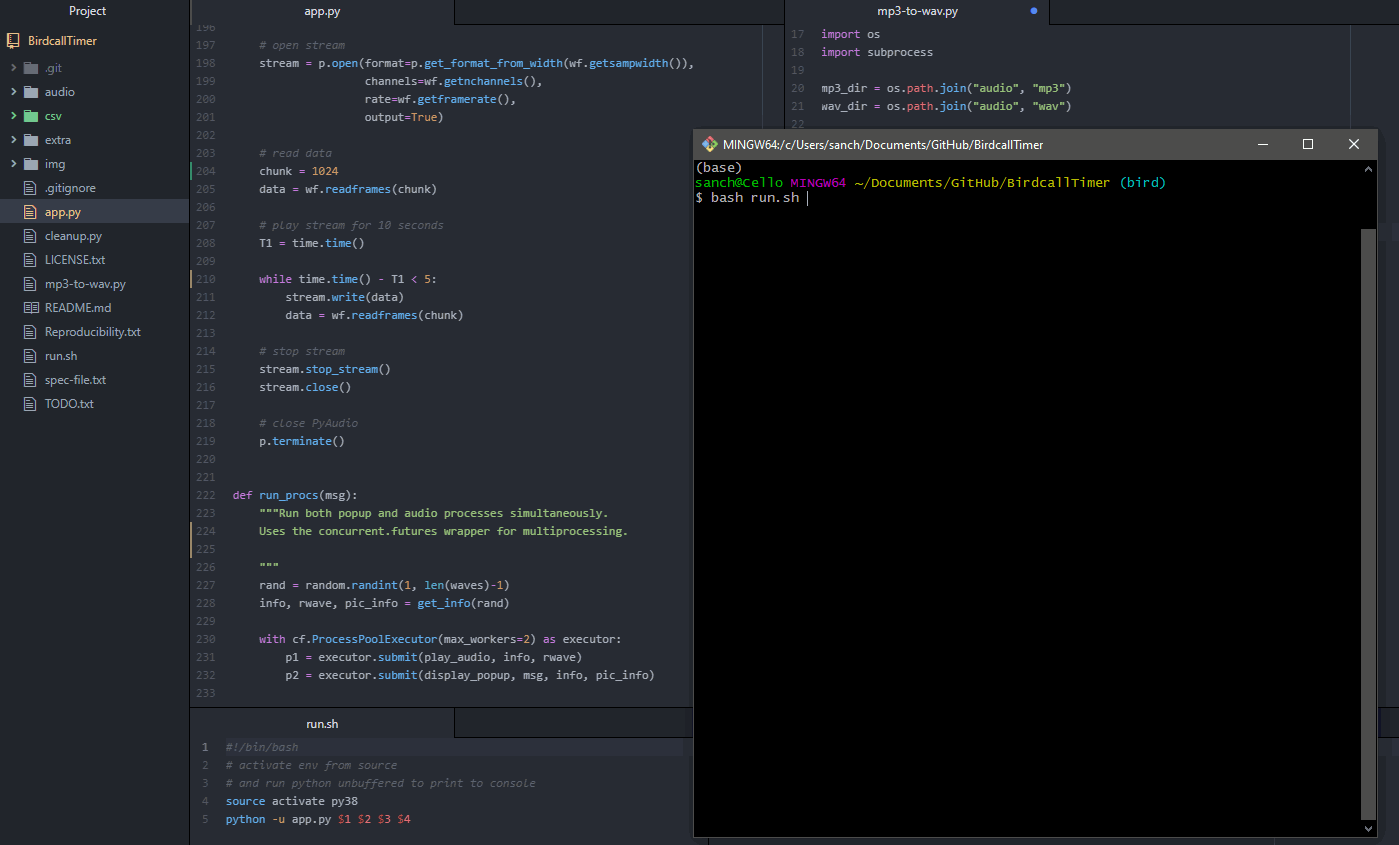Birdcall Timer
A timer for bird lovers, plays a random birdcall while displaying its image and info.
Demo
A brief demo of the timer with dummy (fast) times - unfortunately, it misses the main feature: the birdcall!

Running the Timer
Run the timer with the command bash run.py, which takes 4 arguments:
- first_action: the first desired action, either
sitorstand - mins1: the number of minutes for the first action
- mins2: the number of minutes for the alternative action
- times: the number of times the loop (action 1, action 2) will be repeated
$ bash run.py <first_action, {sit|stand}> <mins1 (float: 0-90)> <mins2 (float: 0-90)> <times (int: 1-10)>
# Example:
# Sit for 45 mins, then stand for 10 mis, repeat process 3 times
$ bash run.py sit 45 10 3
While minutes can have decimals (float type), times has to be an integer. Minutes can only be from 0 to 90 inclusive, and times from 1 to 10 inclusive.
I'm using a bash script instead of a python script to run the timer because I wanted a single command and the python program imports packages that need to be pre-installed, such as wave and pyaudio. For ease of reproducibility (see below) I used a virtual environment that needs to be activated before running the script.
A quick look at the run.py script shows how it calls the python app.py script, passing the 4 arguments to it:
#!/bin/bash
# activate env from source
# and run python unbuffered to print to console
source activate py38
python -u app.py $1 $2 $3 $4
Reproducibility
Limitations
The timer is not 100% reproducible AS IS in this repo - namely: I refrained from uploading (and redistributing) massive amounts of audio and image data.
That said, the code and metadata files are freely distributed in this repo and this section provides instructions on how to reproduce the timer.
File Structure
Both audio and images need to be downloaded and stored in the audio and img folders, as shown:
root
├ audio/
| ├ mp3/
| | ├ amegfi/
| | | ├ XC315598.mpg
| | | ├ XC496109.mpg
| | | ├ ...
| | |
| | ├ amerob/
| | ├ ...
| |
| └ wav/
| ├ amegfi/
| | ├ XC315598.wav
| | ├ XC496109.wav
| | ├ ...
| |
| ├ amerob/
| ├ ...
|
├ img/
| ├ ebird/
| | ├ amegfi.png
| | ├ amerob.png
| | ├ ...
| |
| ├ ...
| └ siriema.jpg
|
├ ...
├ run.sh
└ spec-file.txt
Details
- each recording must be stored in a subfolder with the
ebird_codeabbreviation of the bird species mp3must be converted towav: I've created a python script that does this in bulk (mp3-to-wav.py)jpgmust be converted topng: I've created a python script that does this in bulk (jpg-to-png.py)- there is no need to store images under subfolders, the timer shows images at the bird-species level
- this is why image names are
ebird_codesnotXCodes(xeno-canto catalogue # for specific recordings)
- this is why image names are
- images are usually 480px by 320px, when that is not the case, they must be cropped to fit these dimensions
Audio can be downloaded from the xeno-canto project (see Acknowledgments) and images can be downloaded from the Macaulay Library.
Metadata
If a specific recording is not in the csv/rec_metadata.csv file, at a minimum, the following metadata must be entered in the file:
- ebird_code: the abbreviated species name
- species: the full species name
- date: the date of the recording
- country: the country of the recording
- recordist: the recordist's full name
For images, the following metadata must be entered in the csv/pic_metadata.csv file:
- ebird_code: the abbreviated species name
- url: the Macaulay Library URL, Ex: https://macaulaylibrary.org/asset/357081241
- copyright: the photographer's full name for the copyright notice
Final Notes
The csv/chosen.csv file contains the XCodes for recordings chosen to be randomly selected by the timer script. As a final step, the numeric portion of this catalogue number (Ex. for XC315598, the 315598 part) must be entered in this file.
To reproduce the py38 python 3.8 environment for this project, issue:
$ conda create --name py38 --file spec-file.txt
If this fails, follow step-by-step instructions in Reproducibility.txt.





